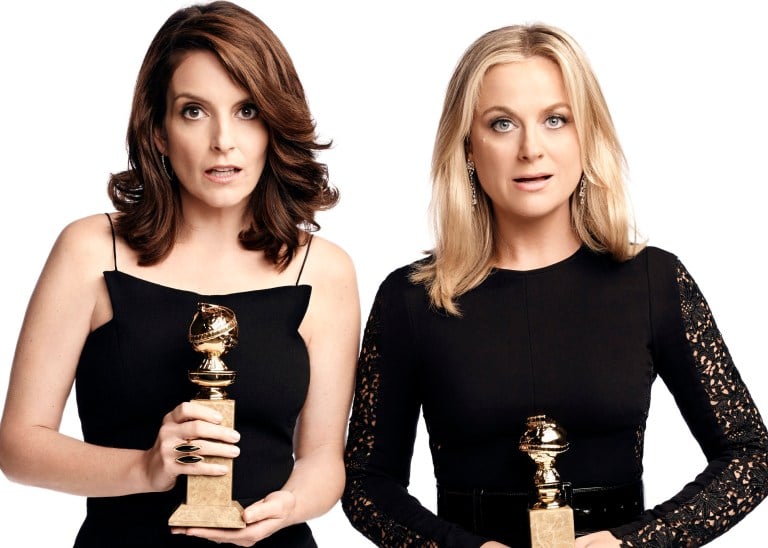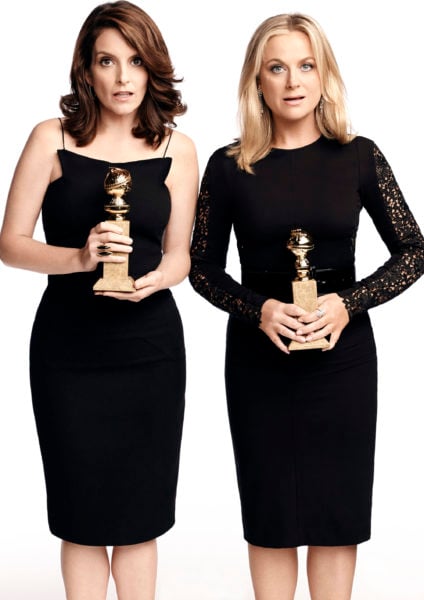
Comedy goddesses, television geniuses, masters of all things funny — no matter what you call them, Tina Fey and Amy Poehler are undeniably, indubitably, and indisputably the best at what they do. But when buzzwords are passed all around the table at dinner and people tack on a variation of “in politically-charged times like these” to the end of their sentences, it’s time to take a step back, consider, and simply appreciate the way they make us laugh. And maybe even learn a little something from them.
Fey and Poehler both got their start in comedy in Chicago, one of the comedy capitals of the world. Most notably, they met and hit it off at the iO Theater, then known as the ImprovOlympic Theater, eventually performing in shows together at The Second City, a comedy troupe and training school known for churning out names such as Steve Carell, Julia Louis-Dreyfus, Keegan-Michael Key and Aziz Ansari. Each independently moved to New York to pursue comedy, with Poehler co-founding the Upright Citizens Brigade (UCB), a comedy group and school on par with The Second City, and Fey hired as a writer — and later cast member — on “Saturday Night Live” (SNL). Eventually, Poehler joined “SNL,” and the rest, of course, is history.
Many have read Fey’s “Bossypants” or Poehler’s “Yes Please,” both autobiographical comedies. From them, you’ll glean Fey’s hyperextended dry-wit and Poehler’s zest for zaniness, and from their audiobooks, you’ll hear it even more. Fey, a nerd in college and claiming to never have taken drugs in her life, and Poehler, unsure about what she wanted and who spent her Chicago days smoking pot with friends, seem like people who, in alternate lifetimes, may never have met save for a serendipitous occasion.
Yet while their paths and careers have been neither straightforward nor simple, I wouldn’t go as far as saying they’ve purposely made their lives overly complex for the sake of advancing their careers. I also wouldn’t call either of them “personalities,” as many comedians have been hailed to be. I’ve found that comedians often have a large number of followers on social media than their actor counterparts, even though their names have typically not circulated the same scope or spheres of media as traditional film and television — but neither Fey nor Poehler have social media accounts. Both of them have gained standing as being brutally honest and brutally ordinary. Both boast embarrassingly nerdy childhood (and college!) photos in their memoirs. Maybe there’s a certain appeal to their stories — a variant on the “smart is the new sexy.” But it’s not a rags-to-riches story, nor do they flaunt their pasts as veritable indicators of “being cool by being uncool.” Arguably, Fey and Poehler are “cool,” in an unusual sort of way. Nevertheless, failing to be big-name stars in their early years, they became exalted as heroes not only for every comedy nerd out there, but for people of all ages who come to know them as the utter epitome of comedy.
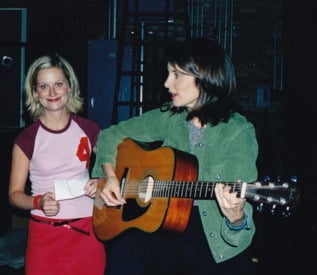
I often take for granted that people know who Fey and Poehler are. Surrounded by others who like the same television and enjoy the same comedy as I do, I fail to realize when people have absolutely no idea what I’m talking about. I like to start out by saying that comedy is under-appreciated — no, comedy is un-appreciated. Comedy is not deserving of our love, time, or effort. Comedy is the lowest of the low, denigrated to the shallowed tier of art, if art at all.
But comedy is improv, sketch, and stand-up. Comedy is performance, theater and your attitude toward life. Comedy is humor, amusement and enjoyment. Comedy is relatable, universal, specific and real. Comedy is preparation, spontaneity and timing. Comedy is juxtaposition, stating the obvious and real-world interaction. Comedy is using a series of phrases in a combination of interrelated sentences and then pointing out that you probably just read them in a really intense narrator voice in your head.
What I see when I watch the television shows “30 Rock” or “Parks and Recreation,” respectively Fey’s and Poehler’s most famous works, I simultaneously see life and what I lack from it. “30 Rock” is a surrealist comedy, and I revel in the moments when it makes fun of itself, breaks the fourth wall, or is not afraid to use the absurd or the eccentric to make the viewer laugh. “Parks and Recreation” is a mockumentary, but doesn’t have the same level of surreal humor as “30 Rock” — rather, it aims to use the awkward moments and glances at the camera to find comedy in those small moments.
Fey’s “30 Rock” was essentially a dramatized version of her job as head writer at SNL. From that description alone, it makes “30 Rock” sound like one of the saddest, most boring shows ever to grace primetime television. Yet the way it takes the characters and their problems and turns it into something so charmingly relatable is a level of comedic beauty that I’ll never be able to achieve. Same with “Parks and Recreation” — it’s not an over-dramatization of a workplace comedy. A similar argument might be made for “The Office”, but I find that Poehler’s character, Leslie Knope, on “Parks and Recreation”, amongst others on the show, are just straight-up likable because they feel like regular people, flaws and quirks and all. They’re not caricatures of people or twisted versions of ourselves — they’re us.
I mark the Tina Fey era, the period when she was head writer (1999-2006), as the best comedy in modern day SNL. Many critics laud that time when she, coincidentally, also the first female head writer on the show, as a period that revitalized the show. Fey cranked out many famous “fake ads,” parodying products or creating advertisements for products that were useless or appeared like a good idea, until suddenly, they were not. Something about these makes them so incredibly funny — they’re all extremely short sketches and remarkably low-key, but when I watch SNL today, I struggle to find the same amount of amusement out of the complex content that is on television versus the simple, almost “average” ideas of the Fey era.
Fey and Poehler only co-anchored the SNL segment “Weekend Update” together for two seasons, 2004-2006, yet their time together on the show is forever engrained in comedic history.
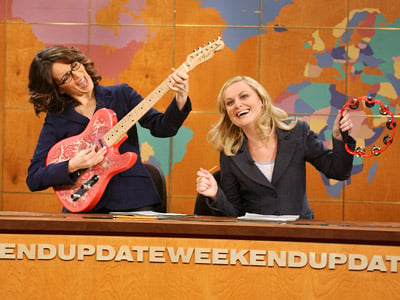
It’s not that I don’t also love the comedy that’s coming out nowadays. I do love my share of politically-infused comedy (“Veep”), meta and socially-active shows (“Master of None,” “Insecure”), and the like. But a little voice sitting in the back of my mind nags and nags, desperate for some of the old stuff.
Fey is currently working on “Unbreakable Kimmy Schmidt,” which she writes and produces. Poehler produces “Broad City,” written by and starring UCB alums Ilana Glazer and Abbi Jacobson. While Fey guest starred in both seasons of “Unbreakable Kimmy Schmidt” (and fingers crossed, upcoming seasons as well), and Poehler guest-starred in a wild episode of “Broad City”, I miss the simplicity in their performances. Maybe I’m too picky and nostalgic about their old work and really just want a return to what I see as some of the best comedy on television ever. I love to see where their ventures will take them, because I know that I’ll be watching all of it, but I want to take time to savor their previous work that was simple and utterly perfect.
Of their two cinematic collaborations, neither “Baby Mama” nor “Sisters” were commercial or critical successes. Those who like Fey and Poehler watched them, laughed, and then went on with their day. Fey has acted in a number of dramas as well, achieving relative success; Poehler has done less work away from television, specifically comedy. A lot of comedians have successfully branched out into drama, but I don’t think it’s necessarily that they’ve tried and failed. For me, there’s something alluring about the simplicity of comedy. It’s hard to hide behind intense, heart-wrenching moments with comedy. Fey and Poehler have achieved something incredibly special and unique in their work, and it has enraptured an entire nation.
Personally, I don’t like to call them “first ladies of comedy.” Honestly, I’m not sure what this title really entails. People may first argue that it’s not fair to have the label “ladies” in the title because that denotes a separation of genders. And yes, comedy is male-dominated, without a doubt. There are also plenty of talented, hysterical comedians out there who pursue their work with great success. I don’t even have an alternate title that I might suggest, which makes me even more unhelpful. But “first ladies” just doesn’t seem sufficient or descriptive enough for their work in comedy. Their style of comedy is specific, and I’m sure plenty of people have comedians that they prefer much more. But I think there’s something to be said about what I keep going back to on the simplicity of their art.
Fey is famous for her deadpan delivery, particularly as co-anchor on “Weekend Update.” But that’s the thing about deadpan. In an objective sense, it’s not even supposed to be funny. For both Fey and Poehler’s shows, I wouldn’t even venture to call the content observational comedy, either. Maybe it’s their background in improv rather than stand-up comedy. Many comedians nowadays go on tour with their stand-up routines even after they trained at improv schools around the country. I will readily admit that stand-up is incredibly hard — I’ve certainly never been courageous enough to try it myself. But with improv, you end up incorporating humor and comedy into your behavior, your gestures, your attitude, your speech, and your mannerisms — it’s just a different skill. With stand-up, often the comedy comes from pointing out things in life and making comments about the state of the world. So no matter how much Fey and Poehler write and produce, there’s something special about their presence onscreen — an inextricable aura that just emanates “funny.”
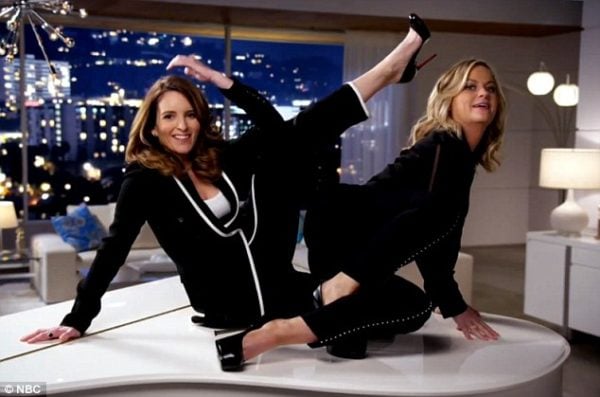
My obsession with their comedy comes a desire to bring their spirit of humor with them around with me wherever I go. At the bottom of my phone case is a silhouette of two figures, each holding an Emmy. Eagle-eyed onlookers will realize that it’s Fey and Poehler. The silhouettes are taken from a photo of them together, standing side-by-side, in fact holding Golden Globes as they posed, slightly dumbstruck, for a promotional photo before they hosted the 2015 Golden Globes.
Poehler has been nominated for 18 Emmys and has won one; Fey has been nominated for 40 Emmys and won nine. Yet what’s so monumental about these achievements is that not only were they the first duo to be nominated and to have won, but also that this cements them as a legendary comedy pair. So when I couldn’t find a decent photo of them together with their Emmys, I jumped to memorialize their win by combining that priceless Golden Globes photo that captures their simple wit with an awards moment that deserved to be captured in time.
When we’re off checking Twitter and asking ourselves what Trump has done now or what disaster has struck somewhere off in the world, I hesitate to trivialize these events by turning immediately to comedy. It’s both tough and emotionally useful to laugh about these events or satirize them, and even worse to turn a blind eye and simply ignore them all together in favor of watching television and going crazy over slapstick comedy. But when all is said and done, I believe there’s something to be said about thinking over the simplicity in which Fey and Poehler work with their art, their lives and their legacies. Without a need to riff off of others’ misfortunes or using circuitous methods to create laughs, comedy comes from an understanding that humor lies within the cracks of our own everyday lives. Every scrap of work they’ve done has helped me appreciate the essence of what I perceive as meaningful, and as a consequence, funny, in my life.
So thank you, Tina Fey. And thank you, Amy Poehler. From the bottom of my heart — thank you.
Contact Olivia Popp at [email protected].
